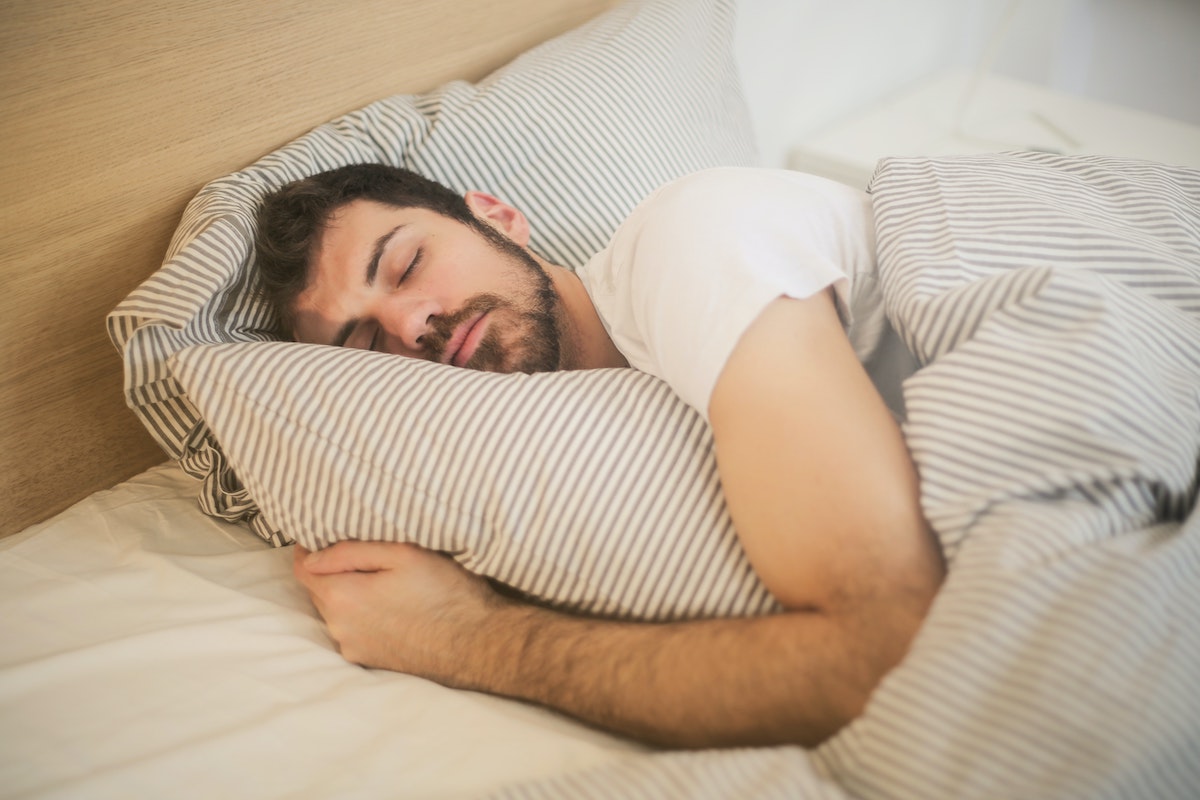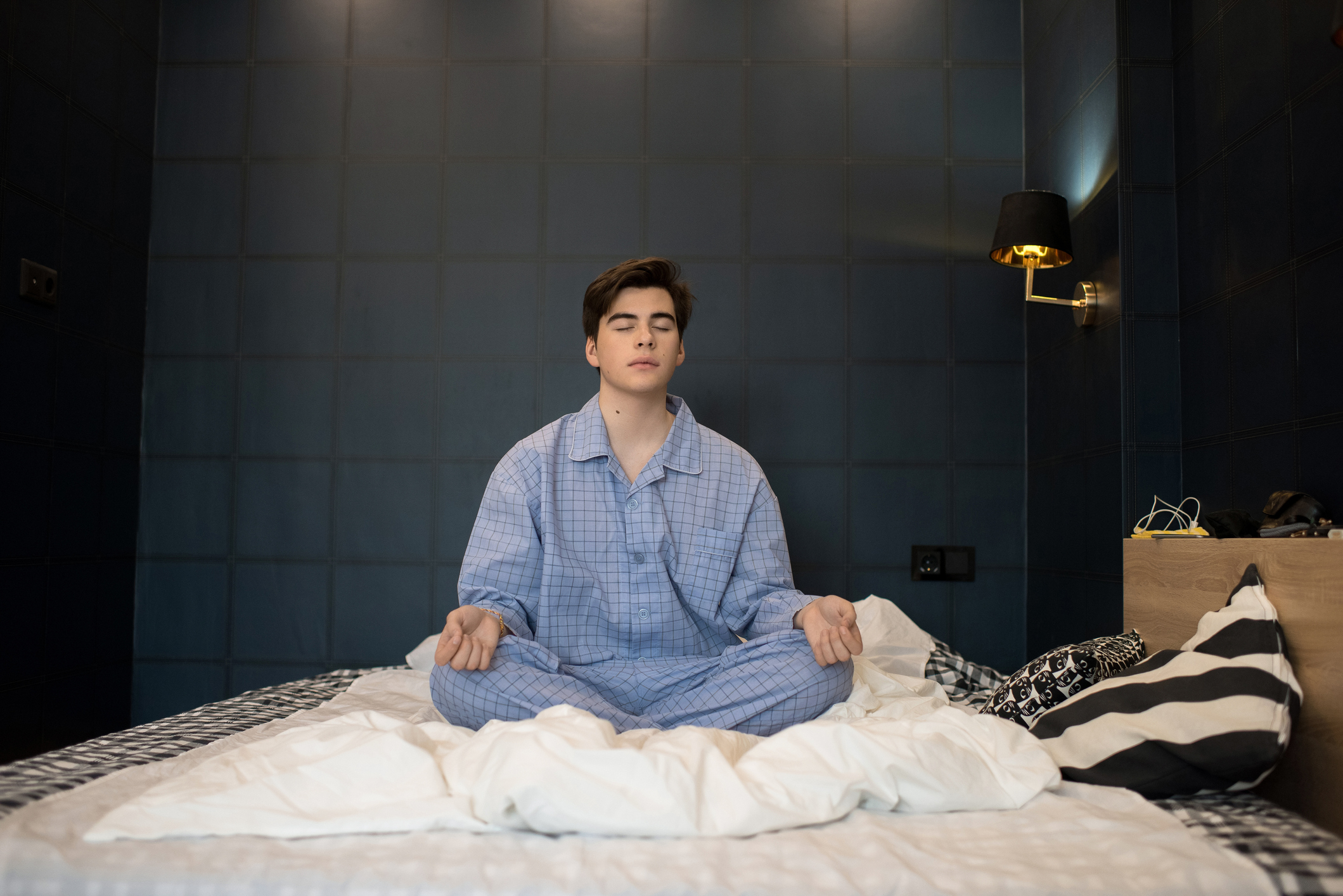
We all know the benefits of a good night’s sleep. There are the physical pros of feeling well rested, which comes with reducing the risk of serious health problems and maintaining a healthy weight. Mentally, it helps reduce stress, allows you to concentrate during the day, and gives you the energy you need to get things done. If you have trouble sleeping, you know how frustrating it can be. We asked sleep experts to weigh in on the zero gravity sleep position to see if it may just help those who need it get the sleep they so desperately need.
What is zero gravity?
So, what is the zero gravity sleep position, sometimes called zero-g, and how does it work? “It’s a sleeping position that elevates the head and feet slightly above the heart level, creating a slight slope for the body,” said Lauri Leadley, CCSH, RPSGT, and Founder and President at Valley Sleep Center. “In the zero gravity sleep position, the angle between the upper body and the thighs is about 120-130 degrees, and the knees are bent slightly.” This means the angle of your hips puts your body in the “zero stress zone,” keeping airways free, reducing stress on the heart, and decompressing your spine.
“Zero gravity sleeping position is typically done with an adjustable bed, raising the head and knees so they are a similar height,” added Kevin Lees, Director of Chiropractic Operations at The Joint Corp. “This position is very similar to a fetal position, only while laying on the back.” Some people refer to an adjustable bed as a zero gravity bed because it makes sleeping in this position for long periods of time possible.

What are the benefits of zero-gravity sleeping?
The benefits of sleeping in zero-g, inspired by an astronaut’s position during lift-off, help reduce the pressure on the neck and body, may include “alleviating back pain, reducing snoring, and improving circulation,” said Leadley. However, she noted, “changing one’s sleep position alone does not guarantee a good night’s sleep.”
Lees added that sleep in a zero gravity position also allows the body to relax and the mattress to be supportive in all areas. “For some, it even improves breathing,” he said. “Certain breathing conditions improve when the head is slightly raised. Having the knees bent can relieve pressure on the lower back and may also improve circulation.” For those people that use a lot of pillows for support, this position can help “eliminate the need for many pillows, which tend to move around during the night and lose their position,” he added.
One of the main benefits of the zero gravity sleep position, said Carlie Gasia, a Certified Sleep Science Coach and Sleep Health Content Specialist at Sleepopolis, is that it can “help to alleviate back pain and reduce pressure on the spine. This is because the angle of elevation reduces the force of gravity on the spine, which can help to relieve tension in the muscles and reduce compression on the discs between the vertebrae.” For the nearly 65 million Americans who reported a recent episode of back pain and 8% of all adults that experience persistent or chronic back pain, this position can offer major relief.

When to see a sleep doctor
Because poor sleep can come from a number of reasons and cause significant health problems, it’s always a good idea to seek the advice of your doctor before you make a big purchase or change the way you sleep. “If you are changing your sleep position to zero gravity because you can’t get relief from the symptoms and disruptions listed above, you should see a sleep doctor,” Leadley advised. “Ask for a sleep study – and get to the bottom of why you have trouble sleeping so that you can enjoy different sleep positions throughout the night.”
The zero gravity sleep position has been shown to be effective in reducing snoring and sleep apnea, “but if you have certain medical conditions like acid reflux or heart problems, may not benefit from this position,” added Gasia. “Consult with a healthcare professional before trying it out.” This position also isn’t ideal for side sleepers or stomach sleepers, said Lees, another reason to check with a professional first before disrupting how you sleep.
Zero gravity sleepers may boast of the benefits mentioned above, but if you’re not sure why you are waking up tired or feeling like you may have sleep apnea or another serious sleep condition, seeking medical advice is always a good first step. Adjustable beds and zero gravity loungers aren’t cheap, and investing in something that costs thousands only to find out you could have solved the issue another way is time (and money) wasted.
That said, there are other benefits of an adjustable bed. It can be an ideal bed for someone who likes to read or watch TV in bed, and it can be a lifesaver if you have some last-minute work on your laptop at night before you doze off. Investing in a bed like a Sleep Number that allows your co-sleeper to adjust their side to a different level can make the night’s sleep even more peaceful.



